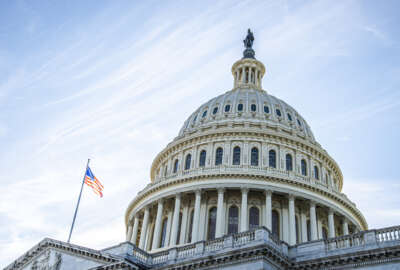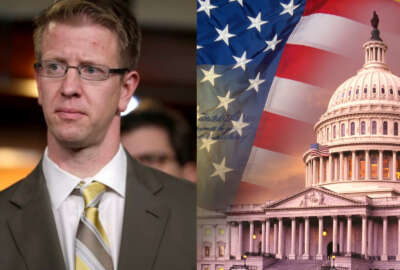Carolyn Davis takes lessons from federal career into new one
Davis retired after 42 years in government. She said she\'s tried to live by a few basic principles, get the job done, get it done right and get it done on time.
wfedstaff | June 4, 2015 3:31 pm
When Carolyn Davis decided to join the federal government in 1971, it wasn’t a hard decision.
She saw the success her parents and other relatives achieved from working for the government. And growing up in Virginia, she saw the impact of federal agencies across the region.
Davis started as a summer student in 1970 and returned to work full time at five agencies: the Health, Education and Welfare Department — which preceded the Department of Health and Human Services — the Interstate Commerce Commission — which no longer exists — the Federal Emergency Management Agency, the Interior Department and the Environmental Protection Agency.

Davis retired in September after 42 years. Her last job was as the director of labor and employee relations at EPA.
The Carolyn Davis File
Length of time in federal government: 42 years
First job in government: Summer student working for the Health, Education and Welfare Department.
Why retire now? I liken work life to weight loss. You have to set goals. You have to have a strategic plan to meet those goals. In the process, you will plateau and flat line sometimes and you have to figure out how to jump start yourself. And lastly, I think it’s very important to understand and know when you have reached those goals because if you run beyond goal post you can become challenged.
Post-retirement plans: I’ve established my own employment consulting business consisting of alternative dispute resolution and equal employment opportunity services. The focus will primarily be on ADR (alternative dispute resolution) because it makes dollars and sense for employees to move away from conflict and back to work. I will begin rolling it out in January 2012.
What has been the impact of your federal career on your life? The government provided me an opportunity to serve this nation from an employee standpoint, from a taxpayer standpoint consistently with dignity, forthrightness and perseverance even in times of adversity or differences and whether in positions as employee or manager and whether my stance or opinion differed from those that were established. You were given the opportunity to speak out. You were given the opportunity to advance. You were given the opportunity to volunteer and that’s what I like and that’s what I’m most proud of about being a member of federal service.
How has the government changed? Back in 1971, basically if you were a female, you would probably come in in a secretarial role. What’s so significant about that era as well is women couldn’t even wear pants to work back then. When the rule finally changed, you had to wear a jacket to cover your derriere. Everyone came to work in a suit. I didn’t see such an environment where people were quite as relaxed as they are now.
How has the office environment changed? It was a quite a different time. I remember the typewriters, the carbon copies. I remember our organization getting this huge piece of equipment called a Lexicon. It was similar to a typewriter, but it would automate more of the activity you were doing using the typewriter. You could get rid of all the carbon paper because you could print the copies you need. People would smoke in the offices and that could be quite uncomfortable for those of us who didn’t smoke. But you could open windows in federal buildings. They came along and sealed the windows so you couldn’t open them anymore.
What are you most proud of about your federal career? My enthusiasm lies with helping people and making differences that positively and readily impacts their lives regardless of their job. When I was at FEMA, I was working with disaster victims who would call you and say thank you very much, I made the proposition for establishing a disaster correspondence unit and that unit is still used today. What a significant impact that had on disaster victims because previously they would send correspondence to agency and it would just lie around somewhere in the correspondence process of every other piece of correspondence. However to give disaster victims correspondence that heightened responsibility, to respond to them really made a difference in the lives of many, many people and it continues to be that way today.
What would you change about government? One of things I would like to see change about government, and I think it’s at a critical point right now, and that is to do more with succession planning. With the baby boomers exiting federal service, I think it’s critical and to keep the interest of the new folks who are coming into federal services, I definitely think we need to kick succession planning into high gear. It may be costs upfront, but great savings behind.
What would you say to someone who wants to join the government? They have a grand opportunity on a grand scale. If they get in, they apply themselves, they volunteer, they engage in mentorships and take on assignments that no one else wants, they will be surprised how much growth there is for them and how much opportunity will present itself. They must embrace the experience by setting their own goals first, learning about the culture of their organization and figuring out how you can make a positive difference. I would tell them to always ask questions and be able to adjust to challenging environments.
What advice would you give to current federal employees? When I hear the diminishing of the importance of the federal worker, or the government is too big, or we need to cut back on their pay, that is a painful thing for me because the government is full of individuals like myself — very hardworking, have integrity and people who put in numerous unpaid hours because they have the commitment, the energy and because they want to see the job done right. I hope they don’t lose sight of that behind some of the political talk of downsizing or the talk of government employees being paid too much. You have to be inside to know what too much means.
Any final thoughts? Throughout my federal career, I’ve held three basic principles: Get the job done, get it done right and get it done on time. It didn’t always happen that way, but those were my goals. As member of federal service, it has meant I’ve had an opportunity to have a great career, be financially sound, raise my two daughters and put them through school. I’ve had the opportunity to share my experiences with others who are not proud of their federal service and talk about how they should look at federal employees. I think it has impacted me in ways that I will forever carry with me even in my private practice to think about how I would do this job if I were in federal service. It has meant more than I could really say.
Copyright © 2024 Federal News Network. All rights reserved. This website is not intended for users located within the European Economic Area.
Jason Miller is executive editor of Federal News Network and directs news coverage on the people, policy and programs of the federal government.
Follow @jmillerWFED






